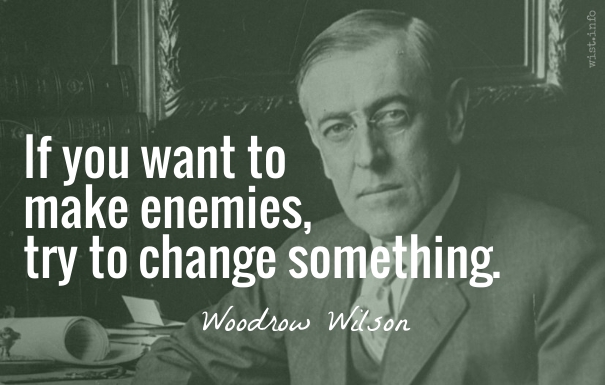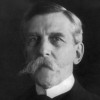When on all sides you showed me that your words were true, and I was overcome by your truth, I had no answer whatsoever to make, but only those slow and drowsy words, “Right away. Yes, right away.” “Let me be for a little while.” But “Right away — right away” was never right now, and “Let me be for a little while” stretched out for a long time.
[Undique ostendenti vera te dicere, non erat omnino quid responderem veritate convictus, nisi tantum verba lenta et somnolenta: “modo,” “ecce modo,” “sine paululum.” Sed “modo et modo” non habebat modum et “sine paululum” in longum ibat.]
Augustine of Hippo (354-430) Christian church father, philosopher, saint [b. Aurelius Augustinus]
Confessions, Book 8, ch. 5 / ¶ 12 (8.5.12) (c. AD 398) [tr. Ryan (1960)]
(Source)
Augustine writing of his reluctance to convert to Christianity. Sometimes paraphrased "By and by never comes."
(Source (Latin)). Alternate translations:
And when Thou didst on all sides show me that what Thou saidst was true, I, convicted by the truth, had nothing at all to answer, but only those dull and drowsy words, "Anon, anon," "presently," "leave me but a little." But "presently, presently," had no present, and my "little while" went on for a long while.
[tr. Pusey (1838)]
And to Thee showing me on every side, that what Thou saidst was true, I, convicted by the truth, had nothing at all to reply, but the drawling and drowsy words: “Presently, lo, presently;” “Leave me a little while.” But “presently, presently,” had no present; and my “leave me a little while” went on for a long while.
[tr. Pilkington (1876)]
And to Thee, on all sides showing me that what Thou saidst was true, I, convicted by the truth, had nothing to say in reply, but only drawling and drowsy words, “Presently; yes, presently;” “Wait a little while." But “presently and presently" had no present; and “wait a little while” went on to a long while.
[tr. Hutchings (1890)]
On all sides Thou didst show me that Thy words are true, and the truth confounded me, so that I could make no reply but slow and drowsy words: "Presently, O presently; let me be a little while.” But my "presently, presently," had no present, and the little while proved a long while.
[tr. Bigg (1897), 8.5.3]
Whereas You showed me by every evidence that Your words were true, there was simply nothing I could answer save only laggard lazy words: “Soon,” “Quite soon,” “Give me just a little while.” But “soon” and “quite soon” did not mean any particular time; and “just a little while” went on for a long while.
[tr. Sheed (1943)]
On all sides, thou didst show me that thy words are true, and I, convicted by the truth, had nothing at all to reply but the drawling and drowsy words: “Presently; see, presently. Leave me alone a little while.” But “presently, presently,” had no present; and my “leave me alone a little while” went on for a long while.
[tr. Outler (1955)]
You used all means to prove the truth of your words, and now that I was convinced that they were true, the only answers I could give were the drowsy words of an idler -- "Soon," "Presently," "Let me wait a little longer." But "soon" was not soon and "a little longer" grew much longer.
[tr. Pine-Coffin (1961)]
And, while you showed me wherever I looked that what you said was true, I, convinced by the truth, could still find nothing at all to say except lazy words spoken half asleep: "A minute," "just a minute," "just a little time longer." But there was no limit to the minutes, and the little time longer went a long way.
[tr. Warner (1963)]
Though you showed me on every side that what you said was true, though convinced of that truth, I had nothing at all to answer other than some dull and drowsy words: "Soon," "Coming soon," "Leave me just a little." But my "little while" stretched on and on.
[tr. Blaiklock (1983)]
You plied me with evidence that you spoke truly; no, I was convinced by the truth and had no answer except the sluggish, drowsy words, "Just a minute," "One more minute," "Let me have a little longer." But these "minutes" never diminished, and my "little longer" lasted inordinately long.
[tr. Boulding (1997)]
Quotations about:
inertia
Note not all quotations have been tagged, so Search may find additional quotes on this topic.
The pack of this world was a kind of pleasant weight upon me, as happens in sleep, and the thoughts in which I meditated on you were like the efforts of someone who tries to get up but is so overcome with drowsiness that he sinks back again into sleep. Of course no one wants to sleep forever, and everyone in his senses would agree that it is better to be awake; yet all the same, when we feel a sort of lethargy in our limbs, we often put off the moment of shaking off sleep, and, even though it is time to get up, we gladly take a little longer in bed, conscious though we may be that we should not be doing so. In just the same way I was quite certain that it was better to give myself up to your charity rather than to give in to my own desires; but, though the former course was a conviction to which I gave my assent, the latter was a pleasure to which I gave my consent.
[Ita sarcina saeculi, velut somno adsolet, dulciter premebar, et cogitationes quibus meditabar in te similes erant conatibus expergisci volentium, qui tamen superati soporis altitudine remerguntur. Et sicut nemo est qui dormire semper velit omniumque sano iudicio vigilare praestat, differt tamen plerumque homo somnum excutere cum gravis torpor in membris est, eumque iam displicentem carpit libentius quamvis surgendi tempus advenerit: ita certum habebam esse melius tuae caritati me dedere quam meae cupiditati cedere, sed illud placebat et vincebat, hoc libebat et vinciebat.]
Augustine of Hippo (354-430) Christian church father, philosopher, saint [b. Aurelius Augustinus]
Confessions, Book 8, ch. 5 / ¶ 12 (8.4.12) (c. AD 398) [tr. Warner (1963)]
(Source)
(Source (Latin)). Alternate translations:
Thus with the baggage of this present world was I held down pleasantly, as in sleep: and the thoughts wherein I meditated on Thee were like the efforts of such as would awake, who yet overcome with a heavy drowsiness, are again drenched therein. And as no one would sleep for ever, and in all men's sober judgment waking is better, yet a man for the most part, feeling a heavy lethargy in all his limbs, defers to shake off sleep, and though half displeased, yet, even after it is time to rise, with pleasure yields to it, so was I assured that much better were it for me to give myself up to Thy charity, than to give myself over to mine own cupidity; but though the former course satisfied me and gained the mastery, the latter pleased me and held me mastered.
[tr. Pusey (1838)]
Thus with the baggage of the world was I sweetly burdened, as when in slumber; and the thoughts wherein I meditated upon Thee were like unto the efforts of those desiring to awake, who, still overpowered with a heavy drowsiness, are again steeped therein. And as no one desires to sleep always, and in the sober judgment of all waking is better, yet does a man generally defer to shake off drowsiness, when there is a heavy lethargy in all his limbs, and, though displeased, yet even after it is time to rise with pleasure yields to it, so was I assured that it were much better for me to give up myself to Thy charity, than to yield myself to my own cupidity; but the former course satisfied and vanquished me, the latter pleased me and fettered me.
[tr. Pilkington (1876)]
Thus with the baggage of this world I was sweetly pressed down, as it happens in sleep ; and the thoughts by which I meditated on Thee were like the efforts of those who would awake, but who being overpowered by deep drowsiness, are again immersed therein. And as no one wishes to be always asleep, and in the sound judgment of all men waking is better; yet often does a man, when a heavy drowsiness is upon his limbs, defer to shake off sleep, and though not approving it, yet even when the time to rise has come, more willingly encourage it; so was I convinced that it was better for me to surrender myself to Thy Charity, than to yield myself up to my own lusts; but the former course approved itself and convinced me, the latter pleased me and held me bound.
[tr. Hutchings (1890)]
So the heavy burden of the world seemed delightful, as in a dream, and my musings on Thee were like the struggles of one who would awake, but falls back overcome by depths of slumber. And as no one wishes to sleep for ever, for all men rightly count waking better, and yet a man will not break his slumber when his limbs are heavy with drowsiness, and is glad to sleep on, though his reason disapproves and the hour for rising has struck, so I knew for certain that it was better to yield to Thy love than to my lust, but the love charmed and could not prevail, the lust pleased and bound me.
[tr. Bigg (1897), 8.5.2]
I was held down as agreeably by this world’s baggage as one often is by sleep; and indeed the thoughts with which I meditated upon You were like the efforts of a man who wants to get up but is so heavy with sleep that he simply sinks back into it again. There is no one who wants to be asleep always -- for every sound judgment holds that it is best to be awake -- yet a man often postpones the effort of shaking himself awake when he feels a sluggish heaviness in the limbs, and settles pleasurably into another doze though he knows he should not, because it is time to get up. Similarly I regarded it as settled that it would be better to give myself to Your love rather than go on yielding to my own lust; but the first course delighted and convinced my mind, the second delighted my body and held it in bondage.
[tr. Sheed (1943)]
Thus with the baggage of the world I was sweetly burdened, as one in slumber, and my musings on thee were like the efforts of those who desire to awake, but who are still overpowered with drowsiness and fall back into deep slumber. And as no one wishes to sleep forever (for all men rightly count waking better) -- yet a man will usually defer shaking off his drowsiness when there is a heavy lethargy in his limbs; and he is glad to sleep on even when his reason disapproves, and the hour for rising has struck -- so was I assured that it was much better for me to give myself up to thy love than to go on yielding myself to my own lust. Thy love satisfied and vanquished me; my lust pleased and fettered me.
[tr. Outler (1955)]
Thus by the burdens of this world I was sweetly weighed down, just as a man often is in sleep. Thoughts wherein I meditated upon you were like the efforts of those who want to arouse themselves but, still overcome by deep drowsiness, sink back again. Just as no man would want to sleep forever, and it is the sane judgment of all men that it is better to be awake, yet a man often defers to shake off sleep when a heavy languor pervades all his members, and although the time to get up has come, he yields to it with pleasure even although it now irks him. In like manner, I was sure that it was better for me to give myself up to your love than to give in to my own desires. However, although the one way appealed to me and was gaining mastery, the other still afforded me pleasure and kept me victim.
[tr. Ryan (1960)]
In fact I bore the burden of the world as contentedly as one sometimes bears a heavy load of sleep. My thoughts, as I meditated upon you, were like the efforts of a man who tries to wake but cannot and sinks back into the depths of slumber. No one wants to sleep forever, for everyone rightly agrees that it is better to be awake. Yet a man often staves off the effort to rouse himself when his body is leaden with inertia. He is glad to settle down once more, although it is against his better judgement and it is already time he were up and about. In the same way I was quite sure that it was better for me to give myself up to your love than to surrender to my own lust. But while I wanted to follow the first course and was convinced that it was right, I was still a slave to the pleasures of the second.
[tr. Pine-Coffin (1961)]
So, as happens in a drowsiness, was I pleasantly loaded with the baggage of this world, and the thoughts I had in mind of you were like the struggles of those who want to wake up, but overcome by deep sleep are drowned in it again. And just as there is no one who wants to go on sleeping for ever (for in any sane man’s judgment it is better to stay awake), still a man does often postpone shaking off sleep, when he feels a heavy lethargy through all his limbs, and in spite of himself is prone to doze again, when often it is time to rise, in just such a fashion, I was certain that it was better to surrender to your love than to give in to my desire. The former course pleased and convinced me; the latter seduced me and held me prisoner.
[tr. Blaiklock (1983)]
I was thus weighed down by the pleasant burden of the world in the way one commonly is by sleep, and the thoughts with which I attempted to meditate upon you were like the efforts of people who are trying to wake up, but are overpowered and immersed once more in slumberous deeps. No one wants to be asleep all the time, and it is generally agreed among sensible people that being awake is a better state, yet it often happens that a person puts off the moment when he must shake himself out of sleep because his limbs are heavy with a lassitude that pulls him toward the more attractive alternative, even though he is already trying to resist it and the hour for rising has come; in a similar way I was quite sure that surrendering myself to your love would be better than succumbing to my lust, but while the former course commended itself and was beginning to conquer, the latter charmed and chained me.
[tr. Boulding (1997)]
Somewhere we must come to see that human progress never rolls in on the wheels of inevitability. It comes through the tireless efforts and the persistent work of dedicated individuals who are willing to be coworkers with God. And without this hard work, time itself becomes an ally of the primitive forces of social stagnation. So we must have time and realize that the time is always right to do right.
Martin Luther King, Jr. (1929-1968) American clergyman, civil rights leader, social activist, preacher
“Remaining Awake Through a Great Revolution,” National Cathedral, Washington, DC (31 Mar 1968)
(Source)
Awful as silence. Hark! the rushing snow!
The sun-awakened avalanche! whose mass,
Thrice sifted by the storm, had gathered there
Flake after flake, in heaven-defying minds
As thought by thought is piled, till some great truth
Is loosened, and the nations echo round,
Shaken to their roots, as do the mountains now.
The great armies, accumulated to provide security and preserve the peace, carried the nations to war by their own weight.
A. J. P. Taylor (1906-1990) British historian, journalist, broadcaster [Alan John Percivale Taylor]
The First World War: A Illustrated History, ch. 1 (1963)
(Source)
There are so many things that we wish we had done yesterday, so few that we feel like doing today.
Mignon McLaughlin (1913-1983) American journalist and author
The Second Neurotic’s Notebook, ch. 10 (1966)
(Source)
As has been pointed out so often, it is characteristic of mankind to make as little adjustment as possible in customary ways in the face of new conditions; the process of social change is epitomized in the fact that the first Packard car body delivered to the manufacturers had a whipstock on the dashboard.
Robert Lynd (1892-1970) American sociologist [Robert Slaughton Lynd]
Middletown, ch. 29 (1929) [with Helen Lynd]
(Source)
There are millions of ways to not be writing.
Rod Serling (1924-1975) American screenwriter, playwright, television producer, narrator
“Rod Serling: The Facts of Life,” Interview with Linda Brevelle (4 Mar 1975)
(Source)
A person who has not done one half his day’s work by ten o’clock runs a chance of leaving the other half undone.
Emily Brontë (1818-1848) British novelist, poet [pseud. Ellis Bell]
Wuthering Heights, ch. 7 (1847) [Nelly]
(Source)
We call ourselves a liberal nation, whereas, as a matter of fact, we are one of the most conservative nations in the world. If you want to make enemies, try to change something. You know why it is. To do things to-day exactly the way you did them yesterday saves thinking. It does not cost you anything. You have acquired the habit; you know the routine; you do not have to plan anything, and it frightens you with a hint of exertion to learn that you will have to do it a different way to-morrow.
Woodrow Wilson (1856-1924) US President (1913-20), educator, political scientist
“The Democracy of Business,” speech, Salesmanship Congress, Detroit (1916-07-10)
(Source)
Usually trimmed down to just: "If you want to make enemies, try to change something."
Start now. Start where you are. Start with fear. Start with pain. Start with doubt. Start with hands shaking. Start with voice trembling but start. Start and don’t stop. Start where you are, with what you have. Just … start.
Can anything be sadder than work left unfinished? Yes: work never begun.
Christina Rossetti (1830-1894) English poet
Time Flies: A Reading Diary, “January 5” (1886)
(Source)
Most of the things we do, we do for no better reason than that our fathers have done them or our neighbors do them, and the same is true of a larger part than what we suspect of what we think.
There is nothing more difficult to carry out, nor more doubtful of success, nor more dangerous to handle, than to initiate a new order of things. For the reformer has enemies in all those who profit by the old order, and only lukewarm defenders in all those who would profit by the new order, this lukewarmness arising partly from fear of their adversaries, who have the laws in their favor; and partly from the incredulity of mankind, who do not truly believe in anything new until they have actual experience of it.
Niccolò Machiavelli (1469-1527) Italian politician, philosopher, political scientist
The Prince, ch. 6 (1513) [tr. Ricci (1903)]
Alt. trans.: "Nothing is more difficult to transact, nor more dubious to succeed, nor more dangerous to manage, than to make oneself chief to introduce new orders. Because the introducer has for enemies all those whom the old orders benefit, and has for lukewarm defenders all those who might benefit from the new orders. [tr. Codevilla]
All the important human advances that we know of since historical times began have been due to individuals of whom the majority faced virulent public opposition.
Bertrand Russell (1872-1970) English mathematician and philosopher
Interview by Woodrow Wyatt, BBC TV (1959)
Collected in Bertrand Russell's BBC Interviews (1959) [UK] and Bertrand Russell Speaks His Mind (1960) [US]. Reprinted (abridged) in The Humanist (1982-11/12), and in Russell Society News, #37 (1983-02).
Most of us are about as eager to be changed as we were to be born, and go through our changes in a similar state of shock.
James Baldwin (1924-1987) American novelist, playwright, activist
“Every Good-Bye Ain’t Gone,” New York Times (19 Dec 1977)
(Source)
Reprinted in The Price of the Ticket (1985).





















